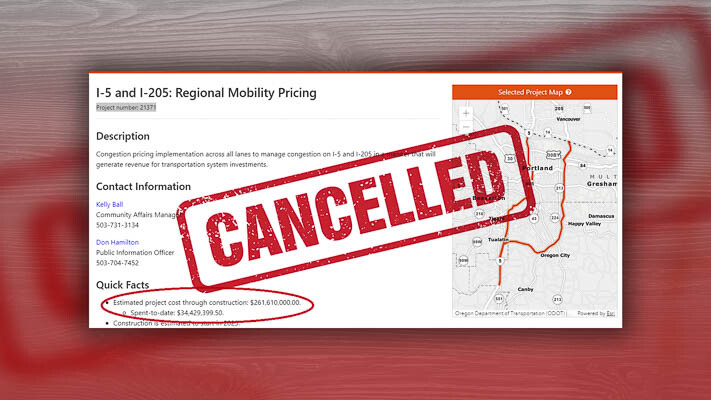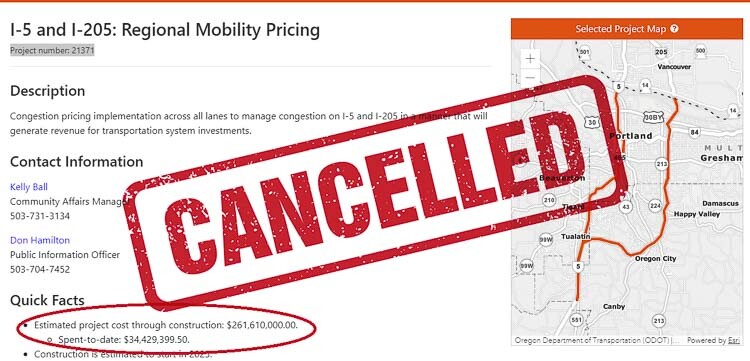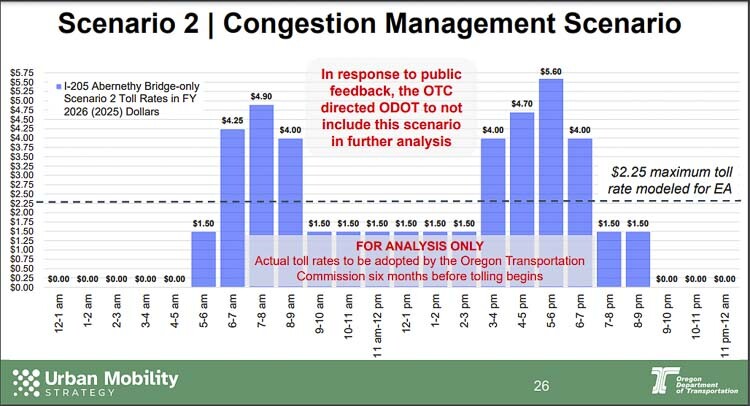
Challenges larger than the benefits governor claims
By John Ley
for Clark County Today
In a major victory for Oregon residents, especially citizens of Clackamas County along the southern I-205 corridor, Governor Tina Kotek canceled one component of tolling for I-5 and I-205 in the state. More specifically, she ended ODOT’s efforts in the Regional Mobility Pricing Project (RMPP) which would charge drivers a “per mile” toll beginning “at the border” with Washington. These would have been in addition to bridge tolls for crossing the Abernethy and Tualatin River bridges.
“The state’s path toward implementing tolling is uncertain at best,” Kotek wrote in a letter to the Oregon Transportation Commission (OTC). “After years of work, the challenges of implementing the RMPP have grown larger than the anticipated benefits. Therefore, I believe it is time to bring the agency’s work on RMPP to an end and delay additional expenditures for implementation of tolling on I-205 to the future when the legislature can further evaluate and provide clearer direction on tolling,” she wrote.
The decision leaves intact the Interstate Bridge Replacement (IBR) program plan for tolling. Last month a subcommittee of the two states transportation commissions met for the first time to begin the process of setting “pre completion tolls.” The IBR team has planned for raising $1.2 billion to $1.5 billion of funding via tolls. Cost increases will raise the price of the project, according program Administrator Greg Johnson, who will reveal an updated finance plan later this year.
It also leaves open the possibility of tolling for the I-205 Abernethy Bridge. Clackamas County Commissioner Paul Savas shared with Clark County Today the fact that ODOT reports a $400 million funding shortfall on the project. He learned late Monday that the construction of the seismic upgrade and lane improvements on the Abernethy Bridge will continue. The Clackamas County Commission has taken a formal position against ODOT’s planned tolling for I-205.

The announcement comes just weeks after a new public opinion poll showed 76 percent of all Portland metro area residents opposed ODOT’s plan for tolling area freeways. The highest opposition was in Clackamas County, at 91 percent. “After being presented with the tolling concepts on Highways 217 and 26 being studied by ODOT, 70% of Multnomah County voters and 80% of Washington County voters opposed those tolls,” the poll cited.
Recently, the Washington State Transportation Commission increased maximum one way tolls by 50 percent on Seattle’s I-405 and 66 percent on SR-167 to $15. The state legislature had to bail out Washington’s entire tolling system during pandemic lockdowns using general fund dollars to cover tolling obligations.
Savas was a member of the original ODOT “Value Pricing” Policy Advisory Committee in 2017-18 where the agency and their consultants ignored the most common sense option for relieving traffic congestion. That would have added a new lane to both I-5 and I-205 in each direction, and only tolled the new lanes. It would have left two or three general purpose, non-tolled lanes for citizens to use.
Today, Savas sits on the Regional Tolling Advisory Committee (RTAC) along with Clark County’s Michelle Belkot and Vancouver Mayor Anne McEnerny-Ogle. The 25-member committee has asked hard questions about tolling. West Linn Mayor Rory Biolostosky recently revealed ODOT expected an 83-86 percent “cost of collection” for implementing tolls on I-205 to fellow committee members. At their January meeting, RTAC was labeled “tone deaf” by one member.
ODOT has spent over $34 million so far, according to one report. They expected to spend $261 million on “congestion pricing implementation across all lanes to manage congestion on I-5 and I-205 in a manner that will generate revenue for transportation system investments.” That $261 million could cover two thirds of the current funding shortfall on the Abernethy Bridge upgrade.
The IBR sent an email to key decision makers yesterday. “With their regional toll program no longer moving forward, our teams are working together to transition operation of tolling for the replacement bridge to the Washington State Department of Transportation (WSDOT),” Johnson said. “Tolling remains a key piece of how bridge replacement will be funded, and WSDOT’s Good To Go team has a solid track record of setting up and managing complex tolling systems.”
But ODOT has no experience in managing a toll program, calling into question why Johnson’s team decided to give Oregon control over IBR tolling to begin with. Members of the Bi-state Bridge Committee of legislators scratched their heads at the initial decision a few years ago when Washington has a system up and running.

The decision by Kotek comes as the Vote Before Tolls effort ramped up signature collection for IP-4. The Constitutional Amendment would guarantee a vote before tolling could be placed on any Oregon highway or freeway.
“Vote Before Tolls Committee declares victory in light of today’s announcement by Gov. Tina Kotek of a halt to mileage-based tolling on I-205 and I-5,” said Dean Suhr, author and chief petitioner of IP-4. “We are pausing our 2024 IP-4 ballot measure campaign as we seek to confirm the halt of not just the RMPP, but also the Willamette and Tualatin River bridge tolls, re-assess the transportation funding landscape, and get a better grip on the massive 2025 Transportation Funding Package that is forthcoming.
“Gov. Kotek’s announcement of a halt on Portland area tolling implementation efforts is a victory,” Suhr exclaimed. “First, we successfully pressured the Governor to defer tolling until January 2026, and now she has changed the deferral to a halt for some of the tolling implementation efforts.”
Former State Rep Jeff Kropf offered his translation of what the governor is really saying: “We Democrats are gonna get our butts kicked in the next election and our majority rule will disappear unless we stop this nonsense and this latest poll shows it”.
The governor’s announcement came days after the short Oregon legislative session came to an end. She had “paused” the tolling a year ago because of growing outrage regarding tolls. The communities along either side of I-205 were up in arms when they learned details regarding traffic diversion that would have ruined the quality of life in their small towns. Some ODOT projections showed double the number of vehicles on side roads, as people sought to avoid paying tolls.
Transportation department Director Kris Strickler said the state’s transportation system is vital to Oregon’s overall health and that tolling could have been a “critical” tool to address some of its needs. His department told the state legislature all the projects in HB 2017 could be built for $5.3 billion. A year later, ODOT admitted they failed to calculate for inflation, and project price tags jumped significantly.
Today, ODOT faces an estimated $3 billion funding shortfall. The I-5 Rose Quarter project price has exploded to $2 billion, from an initial $450 million. Last week, the Federal Highway Administration provided $450 million for the project which still remains without full funding.
Oregon Transportation Commission Chair Julie Brown and Vice Chair Lee Beyer both view tolling as an important part of state transportation funding. “I remain strongly supportive of tolling as one piece of a modern, stable and resilient funding structure,” Beyer wrote following the Kotek announcement. “However, metro leadership views on tolling have changed. Local and regional opposition to tolling makes clear that Oregon is not ready for regional tolling. I respect that change.”
“Despite years of work with local and regional elected officials, community leaders and members of the public, it is clear the toll program cannot be designed in a way that meets the needs expressed by our local partners while also meeting the needs of Oregonians statewide,” Strickler said. Those efforts at outreach were called a sham by former Clark County Councilor Eileen Quiring O’Brien, a member of the Value Pricing PAC. Oregon City Mayor Denyse McGriff said “our concerns are unequivocally not heard by ODOT,” in the current effort.

Kotek last year ordered a pause on toll collections until 2026 so that ODOT could present a finance plan and more thorough report on the impact tolling would have on low-income and minority communities. In her Monday letter to the commission, she said that tolling is not a viable option at the moment. “The finance plan made clear that rising project costs and uncertainty around future toll revenues meant that the state did not have all the funding needed to proceed with the full strategy as originally envisioned,” Kotek wrote.
She added that the agency’s study of a low-income toll program showed that a program that kept toll rates low enough for working families, while still raising enough funds to support new projects, would “fail to meet expectations for local project funding and revenue sharing.”
Savas noted the conclusions the Governor cited also apply to the I-205 Abernethy Bridge toll project. “The RMPP toll is what the Governor is seeking to cancel,” he said. “The analysis led by Clackamas County and the cities along that section of I-205 revealed that tolling all lanes created problems that ODOT has no solution for. Therefore it is evident that the rationale cited by the Governor also point to canceling the Abernethy Bridge toll, hopefully before any more taxpayer money is wasted.”
Also read:
- Plan ahead for ramp closures on I-5 near Ridgefield, July 9-10WSDOT will close three I-5 off-ramps near Ridgefield July 9–10 to test wrong-way detection systems and improve safety.
- Delays expected on Northwest 99th Street during water quality project constructionClark County will begin construction in July to install a stormwater filter vault on NW 99th Street. Drivers can expect delays, but lanes will remain open during the work.
- POLL: What’s the biggest concern you have with the current I-5 Bridge replacement plan?As costs rise and Oregon’s funding fails, concerns mount over the current I-5 Bridge replacement plan. Clark County Today asks readers: what’s your biggest concern?
- Plan ahead for ramp closures on I-5 near Ridgefield, July 8-9Travelers on northbound I-5 near Ridgefield should prepare for ramp closures July 8–9 as WSDOT crews conduct final testing of new wrong-way driving detection systems. The closures affect exits 9 and 11, including the Gee Creek Rest Area.
- Oregon DOT director calls transportation funding bill failure ‘shocking,’ warns of layoffsODOT Director Kris Strickler warned staff that up to 700 layoffs are imminent after lawmakers failed to pass a transportation funding bill, deepening the agency’s $300 million shortfall.









